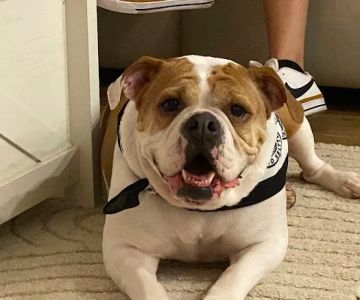Understanding Dog Aggression Towards Other Pets
As a dog owner, one of the most concerning behavioral issues you may face is dog aggression towards other pets. Whether your dog becomes aggressive towards other dogs, cats, or small animals, it can be frustrating and sometimes dangerous. As much as we love our dogs, understanding the root causes of aggression and knowing how to handle it is crucial for maintaining a harmonious household.
What Causes Dog Aggression Towards Other Pets?
Dog aggression can stem from a variety of causes, and it's important to understand the underlying triggers. In some cases, aggression is due to fear or anxiety. For example, a dog that hasn’t been socialized properly may feel threatened by the presence of other pets, leading to defensive or aggressive behavior. Other common causes of aggression include territorial behavior, resource guarding, or a natural prey drive, particularly in smaller animals like cats or rabbits.
Sometimes, aggression can simply be a learned behavior if a dog has had negative experiences with other pets in the past. Understanding your dog's body language and recognizing early signs of aggression can make it easier to address the issue before it escalates.
How to Manage Aggression in Your Dog
If you're dealing with a dog that shows aggression towards other pets, there are several steps you can take to manage the behavior. While some strategies may require professional help, there are effective techniques that you can begin using at home.
1. Proper Socialization
One of the most important steps in preventing aggression is early socialization. If you have a puppy, it's important to expose them to a variety of pets, environments, and situations to help them build confidence and reduce fear-based aggression. For adult dogs that show aggression, gradual exposure to other pets, under controlled circumstances, can help them become more comfortable.
2. Positive Reinforcement Training
Positive reinforcement is a powerful tool for changing your dog’s behavior. Reward your dog for calm and friendly behavior when around other pets. This encourages them to associate the presence of other animals with positive experiences, reducing the likelihood of aggression. Use treats, praise, or playtime as rewards for good behavior.
3. Create a Safe Environment
If your dog is territorial or resource-guarding, creating designated spaces for each pet can help prevent conflict. Ensure that each pet has its own space to retreat to when needed, and never force interactions between aggressive dogs and other pets. Give your dog a quiet, comfortable area where they can feel safe and secure.
4. Work with a Professional Trainer
In cases where aggression is severe, it’s important to consult with a professional dog trainer or animal behaviorist. A professional can provide a personalized training plan to address the aggression and help you manage your dog’s behavior. They can also assist with behavior modification techniques and ensure that interactions between your pets are safe.
Dealing with Aggression Between Dogs
When aggression occurs between dogs, it’s important to remain calm and intervene quickly. If you're introducing a new dog into a household with existing pets, make the introduction slowly and on neutral ground. Allow the dogs to sniff each other from a distance and gradually allow them to interact under supervision. Never leave them alone together until you're sure the behavior is under control.
For dogs that show persistent aggression towards other dogs, crate training and keeping them separated during certain activities can help. Additionally, providing individual attention and training for each dog will help alleviate feelings of competition or jealousy.
Managing Aggression Towards Cats and Smaller Pets
When a dog exhibits aggression towards cats or smaller animals, the approach is similar but may require additional precautions. First and foremost, never leave your dog and smaller pet alone until you're confident the aggression has been addressed. Start with short, supervised interactions where the smaller pet is safely contained, and use positive reinforcement to reward calm behavior.
If your dog has a high prey drive, it may take longer to modify the behavior. In some cases, keeping the pets in separate areas of the home and using barriers such as baby gates or crates can help create safe spaces for both pets.
The Importance of Professional Help
While some dog aggression issues can be addressed with training and behavior modification at home, there are cases where professional help is necessary. A certified dog trainer with experience in aggression issues can work with both you and your pet to create a behavior modification plan tailored to your dog’s specific needs. A veterinarian can also help determine if any underlying medical issues are contributing to the aggression.
In severe cases, a professional behaviorist may also recommend medication to help manage your dog’s anxiety or aggression. Combining medication with training can often result in the best outcomes for your dog’s behavior.
Real-Life Story: Overcoming Aggression with Patience
Take the story of "Max," a German Shepherd who had a history of aggression towards other dogs due to lack of socialization as a puppy. His owners, noticing how stressful their walks had become, decided to seek professional help. Through gradual desensitization, positive reinforcement training, and consistent supervision during dog interactions, Max learned to stay calm around other dogs. It was a long process, but after several months, Max's owners saw a dramatic improvement in his behavior, and now he enjoys walks with his dog friends.
Max’s story is a great reminder that with the right approach, most dogs can learn to coexist peacefully with other pets. It's all about patience, consistency, and creating a supportive environment for your dog.
Final Thoughts on Dog Aggression Management
Dealing with dog aggression towards other pets can be a challenging experience, but it’s not an impossible one. Whether your dog is fearful, territorial, or has other behavioral issues, understanding the root cause of the aggression is key to finding the right solution. With proper training, patience, and sometimes professional assistance, you can help your dog learn to interact more peacefully with other pets, ensuring a safe and happy home for all.











